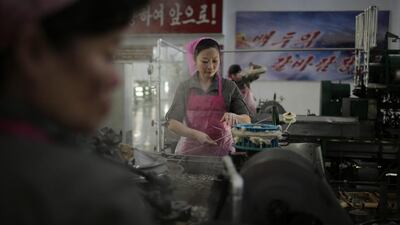PYONGYANG // As the morning light poured through large windows, women wearing olive-coloured overalls, pink aprons and headscarves stood at stations where silkworms were being boiled. Some used their bare hands to pull silk thread from the boilers and winced as the steam rose toward their faces.
But the heat did not seem to slow them down.
The Kim Jong-suk silk mill, named after North Korean leader Kim Jong-un’s grandmother, is where 1,600 workers – mostly women – sort and process silkworms.
The worms, from the countryside in South Pyongan province, ultimately produce silk thread that officials at the Pyongyang factory say is made into roughly 200 tons of silk a year.
Seen prominently on a red-and-white sign hanging above a main corridor was a propaganda slogan: “Let us step up the victorious advancement of socialism through self-development!”
Lining the walkway were names of supervisors and workers that were leading teams, placed as a form of encouragement for the workers.
In his New Year’s address, Mr Kim Jong-un called on the North Korean people to step up production in order to raise the nation’s standard of living, which is among the lowest in Asia. Mr Kim himself visited the silk mill in early January.
In early January, though the temperature outside was minus 6°C, there was little heating in the high-ceilinged building.
And though it was noisy – both from the machinery and from loudspeakers blasting propaganda music – no one seemed to be wearing ear plugs.
Groups of eight to ten women stood before heavy machinery along the processing line, sorting out silkworms as they were being washed and later boiled.
In another room, women examined sheets of unfinished silk with tweezers, looking for impurities as a glowing tabletop illuminated their faces.
The mill was proud to showcase its “sci-tech centre”, where workers could take classes conducted via an intranet system.
It also boasted a childcare facility where 200 children are enrolled while their mothers work at the factory.
* Associated Press

